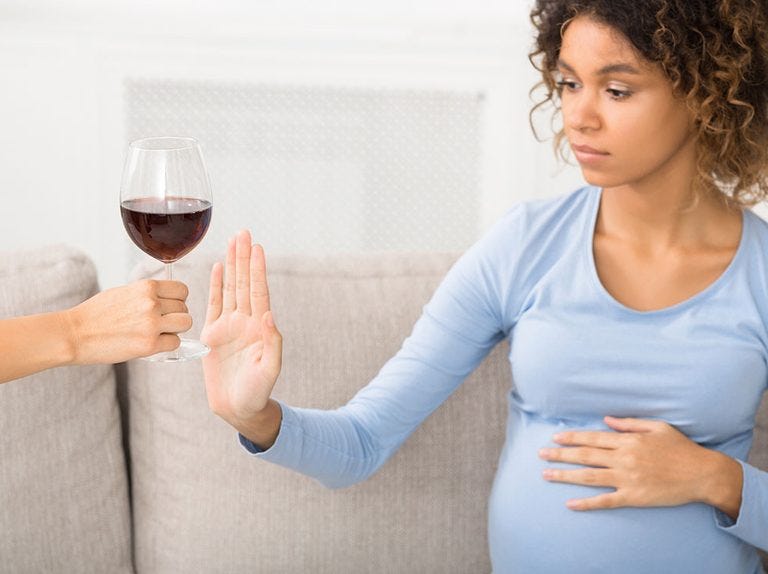Why Shouldn’t You Drink During Pregnancy?
Written by Aarushi Rai
In this day and age, most people know while getting pregnant or during pregnancy that drinking alcohol is a big no. But many question it, believing that just a glass of wine or a beer won’t have any effect. In reality, any amount of drinking during pregnancy has the potential to be very harmful to the baby.
The reason behind this is that alcohol drunk by the mother enters the blood and passes to the baby through the placenta and umbilical cord. The placenta grows in the uterus (womb) and gives the baby food and oxygen, so instead of necessary nutrients, the baby can get alcohol, affecting their development. Firstly, the baby does not have a fully developed liver, so it cannot process alcohol. Alcohol breaks down more slowly in the baby’s body than in the adult’s body, so the baby’s blood alcohol level also stays increased longer than the mother’s.
The baby can also develop a variety of Fetal Alcohol Spectrum Disorders (FASDs), which can include problems with organs and bones, managing and developing emotions/social skills, impulse control and hyperactivity, and more. FASDs do not go away with time, and the risk and likelihood of them increases with the amount drunk. Even outside of FASDs, alcohol use during pregnancy is associated with an increased risk of miscarriage (baby dies in the womb before 20 weeks of pregnancy), preterm birth (baby born before 37 weeks of pregnancy), stillbirth (baby dies in the womb after 20 weeks of pregnancy), and SIDS (Sudden Infant Death Syndrome).
Binge drinking is especially harmful. If done during pregnancy, binge drinking can increase the chances of having a baby with FASDs and can increase the baby’s risk of developing any alcohol-related damage. In general, it isn’t safe to drink any amount of alcohol at any time during pregnancy, even if it is during the first couple of weeks. Alcohol appears to be most harmful during the first three months of pregnancy (the baby can have abnormal facial features), and even drinking moderate amounts of alcohol can cause miscarriage. Heavy drinkers have a greater chance of giving birth to a child with Fetal Alcohol Syndrome. In general, growth and Central Nervous System problems can occur from alcohol use anytime during pregnancy, and there is no safe time for alcohol use during pregnancy.
Not all babies will be affected by alcohol, but there is no way to know which babies will be affected. Thus, even if drinking some alcohol during one pregnancy resulted in no issues for the baby, it is not necessarily true that drinking during another pregnancy will also not hurt the baby.
References
Website, N. (2024, August 1). Drinking alcohol while pregnant. nhs.uk. https://www.nhs.uk/pregnancy/keeping-well/drinking-alcohol-while-pregnant/#:~:text=Drinking%20alcohol%20during%20pregnancy%20increases,alcohol%20spectrum%20disorder%20(FASD)
Alcohol during pregnancy. (n.d.). March of Dimes. https://www.marchofdimes.org/find-support/topics/pregnancy/alcohol-during-pregnancy
Alcohol and pregnancy: MedlinePlus Medical Encyclopedia. (n.d.). https://medlineplus.gov/ency/article/007454.htm
About alcohol use during pregnancy. (2024, May 15). Alcohol and Pregnancy. https://www.cdc.gov/alcohol-pregnancy/about/index.html
Written by Aarushi Rai from MEDILOQUY


